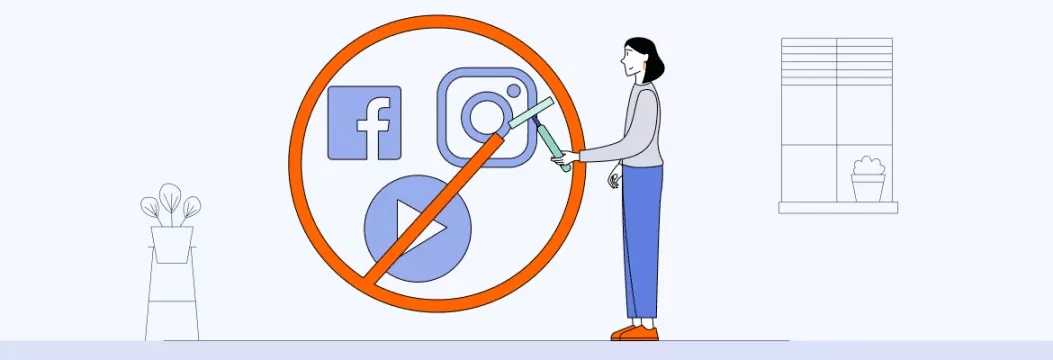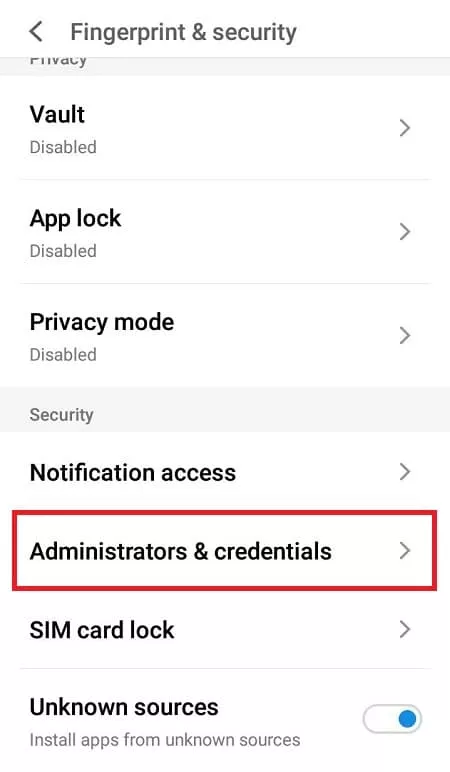Why Some Governments Ban Social Media and How to Still Access It
To say that social media is a big deal would be an understatement — 4.6 billion people use it globally, which is more than a half of the world! But what about the other half? Well, some may not like it, while others…can’t use it at all. The reason? Some governments argue that bans help regulate social media companies, protect citizens, or comply with the online safety act — but many see them as control tactics. So, what countries limit social media use and why do they do it in the first place? Read along to find out.

Role of social media (spoiler: very crucial)
What do people do first thing in the morning? Drink coffee, take a shower, or scroll through their Instagram feed? The last one most likely takes the first place for many. So, what is it about social media that drives this great use? It’s the source of instant information, socializing, entertainment, and news. Social media platforms bring many benefits, like helping to enable online social interaction, support mental health through communities, and manage multiple social media accounts safely. Some of the key perks include:
- Provide communication channels
- Let you access latest news and keep in touch
- Provide education opportunities
- Enable freedom of speech
- Are a great entertainment hub
Blocked social media: Why governments restrict access
If social media is so great, why do some countries block it or restrict access? Well, governments usually claim to be responding to public safety issues when they block social media. But the real reason is often to curb political unrest, suppress citizens’ freedom, or limit the sole or primary purpose of platforms that encourage free voices and alternative narratives. Besides, although there isn’t a single motive behind social media bans, the most common reasons include:
- Maintaining national security
- Maintaining political stability
- Imposing traditional social values
Let’s see now if any of these apply to the following countries.
7 countries that ban social media platforms
Social media censorship goes well beyond North Korea and China — 32 Asian and many African countries restrict social media platforms in some way. We won’t cover every case, but only a few most notable examples of countries imposing bans and restrictions along with their 2021 Internet freedom score. Let’s get going.
🇨🇳 China — the Great Firewall
- What sites are blocked: All Western platforms, like Facebook, Twitter, WhatsApp, Instagram
- China’s Internet freedom score: 10/100 (Not free)
China has been having Facebook, Twitter and Google services blocked since July 2009. This was to cut communication between activists following riots in Xinjiang, an autonomous region in western China. As an alternative for messaging apps, Chinese use WeChat, though its cooperation with tech companies and the state sparks privacy concerns. But the app is obliged to share users’ data with the state. TikTok is unavailable, too, although it was developed by Chinese company Bytedance. Instead, Chinese can use a twin app, Douyin, which blocks international content and puts limits on children’s usage.
🇰🇵 North Korea — Epitome of censorship
- What sites are blocked: All social media platforms
- North Korea’s Internet freedom score: No data for the year 2021, but 3/100 in 2020
North Korea “outshines” the rest of the world. The government had Facebook and Twitter officially blocked in 2016, but it also bans internet access for most of the population, except for high-ranking government officials or scientists (with limitations, of course). They do allow foreign visitors to use the internet and social media, but you won’t enjoy the smoothest connection. Why are there such limits? Simple: North Korea is led by the government that aims to control the media.
🇮🇷 Iran
- What sites are blocked: All Western social media platforms
- Iran’s Internet freedom score: 16/100 (Not free)
2009 saw the first bans of Facebook and Twitter following political unrest because of disputed elections. In 2020, Iran announced collaboration with China to set up a national Iranian internet. This event can ultimately resemble controls of the Great Firewall of China in the near future.
🇮🇳 India social media bans
- What sites are blocked: TikTok
- India’s Internet freedom score: 49/100 (Partly free)
The Indian government has TikTok, along with 58 other mobile apps, banned since June 2020 despite TikTok’s immense popularity in the country. State claims it was to maintain India’s security and public order. But most saw the move as the government’s comeback to clashes between Indian and Chinese forces at the Himalayan border. Facebook, Twitter, Instagram are required to follow new Indian restrictions, otherwise bans are imminent for them, as well.
🇹🇷 Turkey
- What sites are blocked: No popular platforms as of now, but the country regularly restricts access to websites and removes social media posts.
- Turkey’s Internet freedom score: 34/100 (Not free)
Turkey is notorious for its feud with Twitter. It all started in 2014 when the president of Turkey, Tayyip Erdogan, banned the platform because some recordings shared there accused his government of corruption. The ban was temporary — two weeks only — but it took place again later, joined by Facebook and YouTube. In 2020, the country issued new internet legislation, which requires global platforms to store user data within Turkey. Sites with more than a million daily users also have to appoint a local representative and respond quickly to court orders to block or remove content.
🇹🇲 Turkmenistan
- What sites are blocked: All Western social media sites, WeChat, as well as Russian networks
- Turkmenistan’s Internet freedom score: 2/100 (Not free)
A largely Muslim state, Turkmenistan bans all popular social media sites as well as restricts and heavily monitors internet access. Students have to sign statements pledging not to use the internet to access banned sites. Most citizens only have access to Turkmenet, a government-run intranet, with serious social media filters.
🇺🇬 Uganda
- What sites are blocked: Facebook and Instagram. The country also periodically bans other sites, especially during elections.
- Uganda’s Internet freedom score: 49/100 (Partly free)
Social media bans amid elections are common for Uganda. Ruling the country since 1986, Yoweri Museveni accused Facebook (which he later used for his election campaign) of “arrogance”. This was after the platform’s decision to remove accounts linked to the ruling National Resistance Movement (NRM) just days before the general election. Besides, the government tried to tax using social media apps (including Facebook, Instagram, Whatsapp) to “curb online gossip” — people were charged 200 Ugandan shillings (equivalent to USD 0.05 then) per day to use 60 different mobile apps. This tax failed due to immense opposition. But the country didn’t stay put and taxed internet access by 30%!
To sum it up, upholding political stability is the main reason for suppressing social media use for most countries. Couple it with an authoritarian regime, like in China or Turkmenistan, and we can see how some countries are dissolving in their censored environments despite global efforts to protect young people and enforce a minimum age for joining platforms compared to other platforms worldwide.But should it deny you your right to personal freedom?
How to access blocked social media sites
You can bypass internet censorship in a few ways. But the most effective one is using a VPN, like VeePN. VPNs are good at dodging IP-based censorship — they direct your device’s connection through a remote VPN server, instead of that of your internet service provider (ISP), which also gives you an IP address of that VPN server. Besides, VPNs encrypt your connection, shunning whomever may be snooping on your data or browsing history. Let’s take a closer look at what benefits you get with VeePN.
Access the unfiltered web
VeePN has more than 2500 servers scattered across 90 locations in 60 countries. By connecting to one of the servers in a country with no serious limitations, say, the US, you can access a needed website and social media site. You can also stream favorite shows on Netflix, Disney Plus, Prime Video, and other streaming platforms, with no notable speed loss.

Retain your privacy
Did you know that a few countries around the world have formed alliances to spy on their citizens online? All for protecting national security, they say. Still — it sounds spooky. As an example, the US, UK, France, New Zealand, and others are all part of the 5/9/14 Eyes Alliances. It means these countries can ask VPNs to hand over your data, making your right to online anonymity nearly impossible. But there is a loophole! You can use a VPN that isn’t headquartered in any of the 5/9/14 countries, like VeePN, and keep your personal information safe with its No Logs policy.
Protect your connection with top-tier encryption
Keep in mind that even if you live in a democratic country, your government can still monitor your internet activity or order your ISP to hand over user data. As well as ad agencies, internet service providers, and hackers. Want to omit such meddling into your personal life? Encrypt all of your traffic with a VPN! VeePN keeps you safe from cyberattacks and privacy invasions by using the strongest AES-256 encryption and hiding your IP address.
Browse anywhere you want
Access whatever websites and content you want no matter where you go. Install VeePN on any device and platform, from iOS to browser extension and have up to 10 connections with one subscription. You can also set up VeePN on your router and secure your whole household. Surf the web the way it’s supposed to be — with no limits.
FAQ: Why governments ban social media for citizens, including young people
Social media lets you access information and is a great education and entertainment hub. It revolutionized the way we learn new information, and keep in touch. Social media bans have become more common, especially in Asian and African countries. But tools like VeePN provide a way around this.
Countries that ban social media platforms, like Facebook, often don’t want people to freely access information. Governments mostly put these bans to maintain political stability in the country or impose traditional social values.
VeePN is freedom
Download VeePN Client for All Platforms
Enjoy a smooth VPN experience anywhere, anytime. No matter the device you have — phone or laptop, tablet or router — VeePN’s next-gen data protection and ultra-fast speeds will cover all of them.
Download for PC Download for Mac IOS and Android App
IOS and Android App
Want secure browsing while reading this?
See the difference for yourself - Try VeePN PRO for 3-days for $1, no risk, no pressure.
Start My $1 TrialThen VeePN PRO 1-year plan






